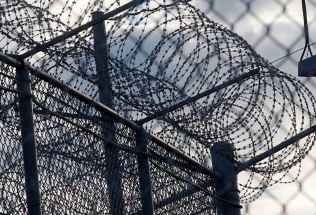Province closes dozens of beds at Milner Ridge jail Decision based on declining inmate population, ‘not to save money’: Justice Department
Read this article for free:
or
Already have an account? Log in here »
To continue reading, please subscribe:
Monthly Digital Subscription
$0 for the first 4 weeks*
- Enjoy unlimited reading on winnipegfreepress.com
- Read the E-Edition, our digital replica newspaper
- Access News Break, our award-winning app
- Play interactive puzzles
*No charge for 4 weeks then price increases to the regular rate of $19.00 plus GST every four weeks. Offer available to new and qualified returning subscribers only. Cancel any time.
Monthly Digital Subscription
$4.75/week*
- Enjoy unlimited reading on winnipegfreepress.com
- Read the E-Edition, our digital replica newspaper
- Access News Break, our award-winning app
- Play interactive puzzles
*Billed as $19 plus GST every four weeks. Cancel any time.
To continue reading, please subscribe:
Add Free Press access to your Brandon Sun subscription for only an additional
$1 for the first 4 weeks*
*Your next subscription payment will increase by $1.00 and you will be charged $16.99 plus GST for four weeks. After four weeks, your payment will increase to $23.99 plus GST every four weeks.
Read unlimited articles for free today:
or
Already have an account? Log in here »
Hey there, time traveller!
This article was published 06/09/2018 (2654 days ago), so information in it may no longer be current.
While Winnipeg is reporting an increase in violent crime, Manitoba is reducing capacity at one of its jails due to a steep drop in inmate numbers.
On Thursday, Justice Department officials informed workers at Milner Ridge Correctional Centre near Lac du Bonnet they will close 56 beds at the facility in mid-October.
According to a notice to Milner staff, obtained by the Free Press, the number of adult inmates in provincial jails fell to 2,111 on Aug. 27, from 2,591 on Sept. 1, 2017.
1.jpg?w=1000)
At Milner, the number dropped to 410 from 550 during the same time period.
“This trend in falling count has been persistent for 12 months,” the memo says. “This reduction in overall inmate counts translates to units being underutilized.”
Asked for comment late Thursday, the Justice Department issued a statement confirming the Milner Ridge numbers. The province said three units at the jail will close next month, but there won’t be any layoffs. However, some staff will see their hours cut. According to the province’s website, Milner Ridge is a minimum, medium and maximum security facility.
“The decision to close these units was made based on the declining population, not to save money,” the department said. “However, over time, fewer people in custody will help to decrease overall expenditures in the correctional system.”
According to the staff memo, there will be a limited opportunity for part-time Milner staff to transfer voluntarily to the Women’s Correctional Centre in Headingley or the Winnipeg Remand Centre.
The falling inmate population seems to fly in the face of recent crime statistics.
In July, the City of Winnipeg released its 2017 crime stats report, which revealed the number of violent, property and drug crimes had risen sharply due, in part, to rise in methamphetamine abuse.
Violent crime in Winnipeg increased by seven per cent 2017 over the previous year. The city’s crime-severity index was at its highest level since 2012, exceeding that of all other Canadian cities.
The numbers beyond the city limits were even more startling, according to Statistics Canada data.
Asked for comment late Thursday, Michelle Gawronsky, president of the Manitoba Government and General Employees’ Union, which represents more than 2,000 correction officers in provincial jails, including about 340 at Milner Ridge, said the numbers don’t add up.
She also said it doesn’t appear the province is “putting public safety first.”
“According to Stats Canada, for three years in a row, violent crime has been increasing in Winnipeg – but at the same time, our jail counts are down, and funding for support and addictions programs have been frozen. This is putting Manitobans at risk,” Gawronsky said in a statement.
The government committed in its criminal justice system modernization strategy to reduce crime, improve community safety and reduce the number of individuals coming into conflict with the law and the criminal justice system, the union leader said.
As well, it committed to reintegrate offenders into the community with essential supports to prevent further offences and further contact with the criminal justice system, Gawronsky said. “This clearly is not happening.”
Meanwhile, the Justice Department, in its statement, did not indicate whether it would close beds at any other provincial jail due to declining inmate numbers.
larry.kusch@freepress.mb.ca

Our newsroom depends on a growing audience of readers to power our journalism. If you are not a paid reader, please consider becoming a subscriber.
Our newsroom depends on its audience of readers to power our journalism. Thank you for your support.



1.jpg?h=215)






